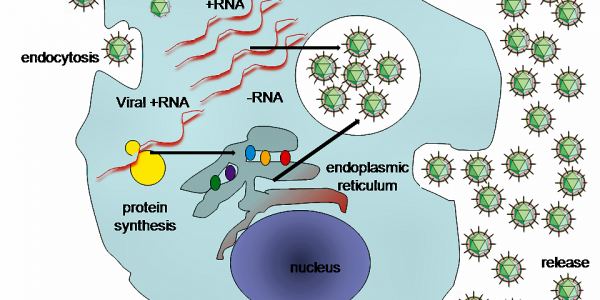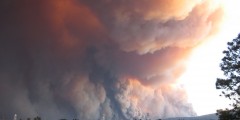The social and metaphorical life of viruses
October 30, 2020
Metaphors are an essential part of science, from doing basic science to engaging in popular science communication. They can be used sporadically; they can be used more systematically to conceptualise a topic, for example the structure and function of DNA; or they can be used in a veritable firework sprinkled across one article. I once …
Metaphors and realities: Coronavirus and climate change
September 18, 2020
We have been surrounded by global disasters this year, inflicted on us by ‘invisible enemies’. These invisible enemies have been made visible in two ways. In the case of the pandemic, disaster metaphors related to floods, fire and storms have made the coronavirus visible. In case of climate change, real floods, fires, storms and droughts …
‘A fire raging’: Why fire metaphors work well for Covid-19
July 31, 2020
This is a post by Elena Semino, University of Lancaster. It was first published on the website of the ESRC Centre for Corpus Approaches to Social Science (CASS) on 1 July, 2020. It provides a thorough and fascinating analysis of fire metaphors used during the pandemic. *** Since the beginning of the Covid-19 pandemic, metaphors have been …
Pandemic blogging: Taking stock
July 24, 2020
Over the last few months I have written a number of blog posts about the social and cultural impacts of the current pandemic of COVID-19 caused by SARS-CoV-2. In this post I want to provide a brief overview of the various topics I have covered, from metaphors to politics. Pandemic metaphors As early as January …
Gene writing: Between art and nature
July 17, 2020
In the past, I have written a bit about genomics, synthetic biology and gene editing, from the perspective of language and culture. So, when Matthew Cobb alerted me to a new thing called ‘gene writing’ at the beginning of July, I pricked up my ears. I told myself that I should write a blog post …
Pandemic landscapes: Peaks and tunnels, waves and plateaus
May 6, 2020
Since the beginning of the Covid-19 pandemic I have collected metaphors used to talk about it. First there were metaphors for the virus and for what to do about the spread of the virus and so on. Then there were metaphors of lockdowns, confinement and imprisonment but also more hopeful ones of journeys. Now metaphors …
Science, sanity and sanitation
April 25, 2020
Lots of things keep happening in this pandemic… Two things, in particular, happened over the last couple of days, which made me and many others sit up and think. The membership of SAGE, the Scientific Advisory Group on Emergencies, was revealed at last, and we heard that Dominic Cummings attended meetings. At the same time, …
Our pandemic future: A metaphorical exploration
April 17, 2020
We have reached a point in the pandemic when many people are beginning to yearn for a return to normal life, beyond lockdowns, confinements or sheltering in place. Ed Yong, the renowned science writer, has written some great pieces for The Atlantic on the pandemic. The latest one is called “Our Pandemic Summer” (15 April) …
Being on a journey while staying at home: More about corona metaphors
April 10, 2020
Yesterday afternoon, I talked to somebody about coronavirus metaphors, which ones were good, which ones were bad etc. Of course, we discussed war metaphors. But I also said that people seem to have overlooked another, less conspicuous metaphor, the ‘journey’ metaphor. The journey metaphor is an important example of a ‘conceptual metaphor’ in Lakoff and …
Metaphors in the time of coronavirus
March 17, 2020
On Sunday, 15th March, Kenan Malik wrote an article on metaphors for The Observer. This was inspired by Matthew Cobb’s new book on The Idea of the Brain which delves into the many metaphors of and for the brain that have been used over time. I have just started to read that book – a …
Subscribe by email
About this blog
This blog promotes discussion of topics related to the research programme 'Making Science Public: Challenges and Opportunities'. Our purpose is not to 'make science public'. Instead, we want to study the opportunities that have emerged for science to be more openly practiced and debated, but also the challenges posed by making science public or by promoting the making public of science as a solution to a variety of problems in society and in politics.
This blog will report on these and other issues related to the Leverhulme funded research programme: Making Science Public: Challenges and Opportunities
Useful links
Recent Posts
- Climate change and climate discourse: A dual disintegration
- Erving Goffman: Memories, method and metaphors
- Participation at the core: AI, ELSI and community engagement
- Understanding computational hermeneutics: Making meaning between the past and the present
- AI winter and AI bubble: Historical and metaphorical reflections
 MSP bookmarks
MSP bookmarks
- Twitter May 8, 2017
- Social innovations in Europe #RRI November 3, 2015
- Harvey Graff, the undisciplinarian September 20, 2015
- Replacing Pesticides With Genetics August 31, 2015
- Addressing hazardous chemicals in the circular economy August 25, 2015
Categories
- antibiotics
- anticipatory governance
- artifical intelligence
- big data
- biotechnology
- citizen science
- Climate Change
- Climate Politics
- co-production
- coronavirus
- Creationism
- Definition of Science
- designer babies
- disease
- disease
- engineering
- epigenetics
- Food Security
- Food sovereignty
- gene drive
- genomics
- GM Food
- GMOs
- history of science
- Hype
- images and visualisations
- imaginaries
- Immigration
- Impact
- infectious diseases
- innovation
- interdisciplinarity
- Knowledge Society
- Language
- Markets
- Metaphors
- microbiome
- neoliberalism
- Neuroscience
- open access
- Personal Reflection
- Politics
- Public education
- public engagement with science
- public needs
- public participation
- public policy
- public service
- publics
- regulatory science
- Religion
- Republican Party
- research impact
- responsible innovation
- responsive research
- Richard Dawkins
- risk
- Scepticism
- Science
- Science and Government
- science and politics
- Science and Songs
- science communication
- Science Communication
- Science Fiction
- Science Policy
- Social science
- sociology
- space
- space exploration
- synthetic biology
- transparency
- Trust
- Uncategorized
- Uncertainty
- visualisation
- wonder










